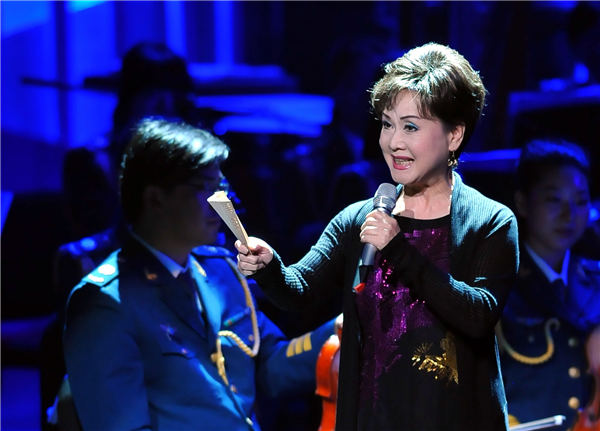Celebrating a Memorable Song
 |
| Li Guyi performs at a concert that featured works by Chinese songwriter Yan Su in Beijing on July 26, 2010. [Xinhua] |
Li Guyi is to perform Homeland Love to mark 40 years of China's reform and opening-up.
In 1980, Chinese singer Li Guyi performed a song, entitled Homeland Love, a mellow love ballad written by Ma Jinghua and Zhang Peiji, which made the then 36-year-old singer of the Central Symphony Orchestra - now known as China National Symphony Orchestra-into a household name in China.
"The song was well received by audiences and I was asked to sing it again and again when I performed across the nation then," recalls Li, 74, who once gave 72 performances in 50 days nationwide.
However, her performance also became controversial. Instead of using a solid, wide vocal range while singing, a style which dominated the music scene in the country then, Li sounded sweet, easy and used air-breathing singing, a pop-singing style that challenged the aesthetics of singing in China at the time.
The lyrics of the song were also criticized heavily by critics and some audiences as "decadent music".
Disappointed and sad, Li was set to give up singing the song anymore when the turning point came in 1983.
That year, she was invited to perform six songs at China Central Television's first Spring Festival Gala, known as chunwan in Chinese, one of the most-watched annual shows in Chinese broadcast on the eve of the Lunar New Year.
But Homeland Love was not included on the list.
Then, a lot of viewers called in, asking for Li to perform the song at the gala. And the gala's director Huang Yihe made the decision to broadcast Li's performance of the song.
Since then, Homeland Love has become a hit, and is one of Li's most popular songs.
"It's a beautiful song and most importantly, audience views about art started to change thanks to the reform and liberation of thought that went on through the 1980s," says Li.
"It was during that time that China started to develop its own pop music, which offered a platform for songwriters to create original material."
As this year marks the 40th anniversary of the launch of China's reform and opening-up, the veteran singer will hold a concert in Beijing on Thursday, which will see her perform Homeland Love again.
Li's students, over 20 professional Chinese singers, including Fu Disheng, Wang Lida and Zhang Ye, will join Li, performing over 30 songs written by Chinese songwriters since the reform and opening-up process began in 1978.
"China's reform and opening-up not only brought economic opportunity for the country, but also offered a change for musicians," says Li.
"Before the reform and opening-up, songs performed on TV were similar-grand performances dealing with big topics. But after that, a diversity of music styles started to emerge and songwriters tended to depict personal emotions."
During the concert, Li will perform her best-known hits, including Homeland Love, My Motherland and Me and Unforgettable Tonight, a song which has been used as the closing song for the annual Spring Festival Gala for 32 years.
Speaking about Unforgettable Tonight, Song Guanlin, the general manager of the China Oriental Performing Arts Group, the organizer of Li's upcoming concert, says: "It is a slow, smooth song, which is like a happy ending to the gala. For Chinese audiences, the gala is not over until it is performed. It has become a tradition."
Li, who was born in Kunming, Yunnan province, began her music and theater career at the age of 15, when she started studying huaguxi opera, a folk music and dance art form in Hunan, at the Hunan Art Institute.
She then worked with the Hunan Huaguxi Opera Theater from 1961 to 1974 as an actress.
And after becoming a solo singer with the Central Symphony Orchestra in 1974, Li has toured with the orchestra to perform in China and abroad, including in France, the United States and Japan.
She also received training in Western vocal performance and combined it with Chinese singing techniques. Besides, she promotes original Chinese songs featuring musical elements from Chinese folk operas and ethnic groups.
"It's an approach I use when I teach young Chinese singers-to learn and sing Chinese folk operas first," says Li.
"There are over 300 forms of Chinese operas and different techniques of singing used by Chinese ethnic groups. Those art forms are unique treasures, which deserve further study and promotion.
"When you look back on Chinese songs written during the 1980s, you feel that the lyrics are poetic and the melodies are inspired by Chinese tradition," says Li.
"During the past 40 years, the Chinese music scene has blossomed. I hope that the new generation of musicians, who are often influenced by the West, base their music on their Chinese roots."
(Source: China Daily)
Please understand that womenofchina.cn,a non-profit, information-communication website, cannot reach every writer before using articles and images. For copyright issues, please contact us by emailing: website@womenofchina.cn. The articles published and opinions expressed on this website represent the opinions of writers and are not necessarily shared by womenofchina.cn.


 京公网安备 11010102004314号
京公网安备 11010102004314号